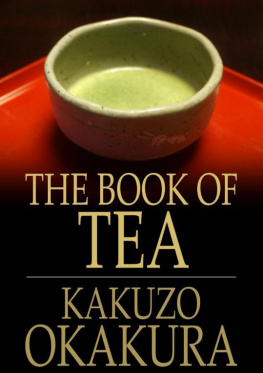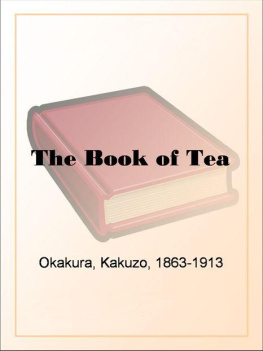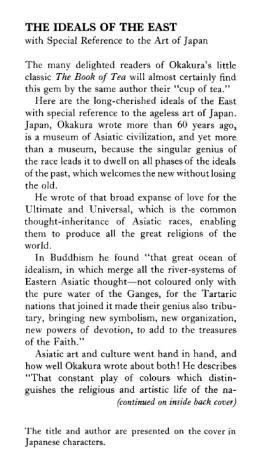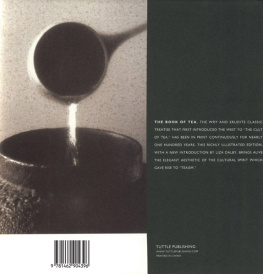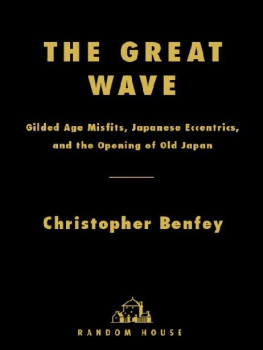Okakura - The Book of Tea
Here you can read online Okakura - The Book of Tea full text of the book (entire story) in english for free. Download pdf and epub, get meaning, cover and reviews about this ebook. City: Auckland;N.Z;Japan, year: 2009, publisher: The Floating Press, genre: Science. Description of the work, (preface) as well as reviews are available. Best literature library LitArk.com created for fans of good reading and offers a wide selection of genres:
Romance novel
Science fiction
Adventure
Detective
Science
History
Home and family
Prose
Art
Politics
Computer
Non-fiction
Religion
Business
Children
Humor
Choose a favorite category and find really read worthwhile books. Enjoy immersion in the world of imagination, feel the emotions of the characters or learn something new for yourself, make an fascinating discovery.
The Book of Tea: summary, description and annotation
We offer to read an annotation, description, summary or preface (depends on what the author of the book "The Book of Tea" wrote himself). If you haven't found the necessary information about the book — write in the comments, we will try to find it.
The Book of Tea — read online for free the complete book (whole text) full work
Below is the text of the book, divided by pages. System saving the place of the last page read, allows you to conveniently read the book "The Book of Tea" online for free, without having to search again every time where you left off. Put a bookmark, and you can go to the page where you finished reading at any time.
Font size:
Interval:
Bookmark:
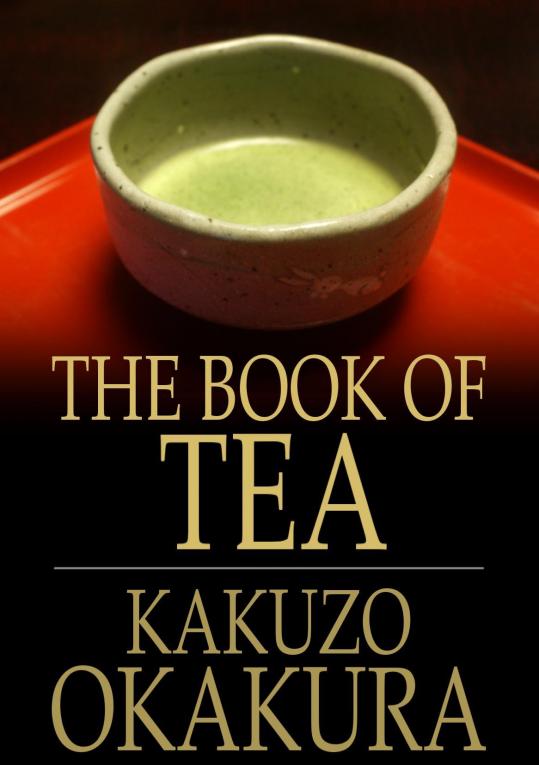

The Book of Tea
First published in 1906.
ISBN 978-1-775414-93-3
2009 THE FLOATING PRESS.
While every effort has been used to ensure the accuracy and reliability of the information contained in The Floating Press edition of this book, The Floating Press does not assume liability or responsibility for any errors or omissions in this book. The Floating Press does not accept responsibility for loss suffered as a result of reliance upon the accuracy or currency of information contained in this book. Do not use while operating a motor vehicle or heavy equipment. Many suitcases look alike.
Visit www.thefloatingpress.com
Tea began as a medicine and grew into a beverage. In China, in theeighth century, it entered the realm of poetry as one of the politeamusements. The fifteenth century saw Japan ennoble it into areligion of aestheticismTeaism. Teaism is a cult founded on theadoration of the beautiful among the sordid facts of everydayexistence. It inculcates purity and harmony, the mystery of mutualcharity, the romanticism of the social order. It is essentially aworship of the Imperfect, as it is a tender attempt to accomplishsomething possible in this impossible thing we know as life.
The Philosophy of Tea is not mere aestheticism in the ordinaryacceptance of the term, for it expresses conjointly with ethics andreligion our whole point of view about man and nature. It ishygiene, for it enforces cleanliness; it is economics, for it showscomfort in simplicity rather than in the complex and costly; it ismoral geometry, inasmuch as it defines our sense of proportionto the universe. It represents the true spirit of Eastern democracyby making all its votaries aristocrats in taste.
The long isolation of Japan from the rest of the world, so conduciveto introspection, has been highly favourable to the development ofTeaism. Our home and habits, costume and cuisine, porcelain,lacquer, paintingour very literatureall have been subject to itsinfluence. No student of Japanese culture could ever ignore itspresence. It has permeated the elegance of noble boudoirs, andentered the abode of the humble. Our peasants have learnedto arrange flowers, our meanest labourer to offer hissalutation to the rocks and waters. In our common parlancewe speak of the man "with no tea" in him, when he isinsusceptible to the serio-comic interests of the personaldrama. Again we stigmatise the untamed aesthete who,regardless of the mundane tragedy, runs riot in the springtideof emancipated emotions, as one "with too much tea" in him.
The outsider may indeed wonder at this seeming much adoabout nothing. What a tempest in a tea-cup! he will say.But when we consider how small after all the cup of humanenjoyment is, how soon overflowed with tears, how easilydrained to the dregs in our quenchless thirst for infinity, weshall not blame ourselves for making so much of the tea-cup.Mankind has done worse. In the worship of Bacchus, wehave sacrificed too freely; and we have even transfiguredthe gory image of Mars. Why not consecrate ourselves tothe queen of the Camelias, and revel in the warm streamof sympathy that flows from her altar? In the liquid amberwithin the ivory-porcelain, the initiated may touch the sweetreticence of Confucius, the piquancy of Laotse, and theethereal aroma of Sakyamuni himself.
Those who cannot feel the littleness of great things inthemselves are apt to overlook the greatness of little thingsin others. The average Westerner, in his sleek complacency,will see in the tea ceremony but another instance of thethousand and one oddities which constitute the quaintnessand childishness of the East to him. He was wont to regardJapan as barbarous while she indulged in the gentle arts ofpeace: he calls her civilised since she began to commitwholesale slaughter on Manchurian battlefields. Muchcomment has been given lately to the Code of the Samurai,the Art of Death which makes our soldiers exult in self-sacrifice; but scarcely any attention has been drawn toTeaism, which represents so much of our Art of Life.Fain would we remain barbarians, if our claim to civilisationwere to be based on the gruesome glory of war. Fainwould we await the time when due respect shall be paid toour art and ideals.
When will the West understand, or try to understand, theEast? We Asiatics are often appalled by the curious webof facts and fancies which has been woven concerning us.We are pictured as living on the perfume of the lotus, if noton mice and cockroaches. It is either impotent fanaticism orelse abject voluptuousness. Indian spirituality has beenderided as ignorance, Chinese sobriety as stupidity, Japanesepatriotism as the result of fatalism. It has been said that weare less sensible to pain and wounds on account of thecallousness of our nervous organisation!
Why not amuse yourselves at our expense? Asia returns thecompliment. There would be further food for merriment ifyou were to know all that we have imagined and writtenabout you. All the glamour of the perspective is there, all theunconscious homage of wonder, all the silent resentment ofthe new and undefined. You have been loaded with virtuestoo refined to be envied, and accused of crimes toopicturesque to be condemned. Our writers in the pastthewise men who knewinformed us that you had bushy tailssomewhere hidden in your garments, and often dined off africassee of newborn babes! Nay, we had something worseagainst you: we used to think you the most impracticablepeople on the earth, for you were said to preach what younever practiced.
Such misconceptions are fast vanishing amongst us.Commerce has forced the European tongues on many anEastern port. Asiatic youths are flocking to Western collegesfor the equipment of modern education. Our insight does notpenetrate your culture deeply, but at least we are willing tolearn. Some of my compatriots have adopted too much ofyour customs and too much of your etiquette, in the delusionthat the acquisition of stiff collars and tall silk hats comprisedthe attainment of your civilisation. Pathetic and deplorable assuch affectations are, they evince our willingness to approachthe West on our knees. Unfortunately the Western attitude isunfavourable to the understanding of the East. The Christianmissionary goes to impart, but not to receive. Your informationis based on the meagre translations of our immense literature,if not on the unreliable anecdotes of passing travellers. It israrely that the chivalrous pen of a Lafcadio Hearn or that ofthe author of "The Web of Indian Life" enlivens the Orientaldarkness with the torch of our own sentiments.
Perhaps I betray my own ignorance of the Tea Cult by beingso outspoken. Its very spirit of politeness exacts that you saywhat you are expected to say, and no more. But I am not tobe a polite Teaist. So much harm has been done already bythe mutual misunderstanding of the New World and the Old,that one need not apologise for contributing his tithe to thefurtherance of a better understanding. The beginning of thetwentieth century would have been spared the spectacle ofsanguinary warfare if Russia had condescended to knowJapan better. What dire consequences to humanity lie in thecontemptuous ignoring of Eastern problems! Europeanimperialism, which does not disdain to raise the absurd cry ofthe Yellow Peril, fails to realise that Asia may also awakento the cruel sense of the White Disaster. You may laugh atus for having "too much tea," but may we not suspect thatyou of the West have "no tea" in your constitution?
Font size:
Interval:
Bookmark:
Similar books «The Book of Tea»
Look at similar books to The Book of Tea. We have selected literature similar in name and meaning in the hope of providing readers with more options to find new, interesting, not yet read works.
Discussion, reviews of the book The Book of Tea and just readers' own opinions. Leave your comments, write what you think about the work, its meaning or the main characters. Specify what exactly you liked and what you didn't like, and why you think so.

